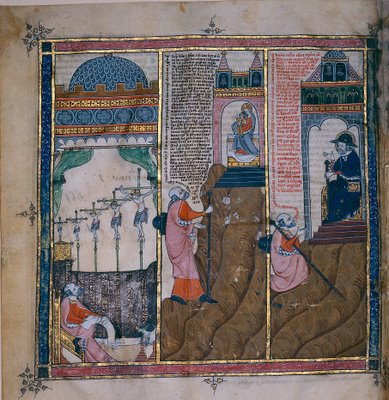
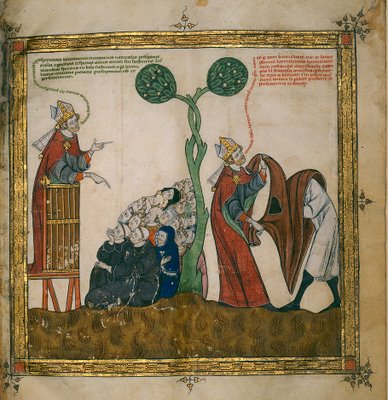
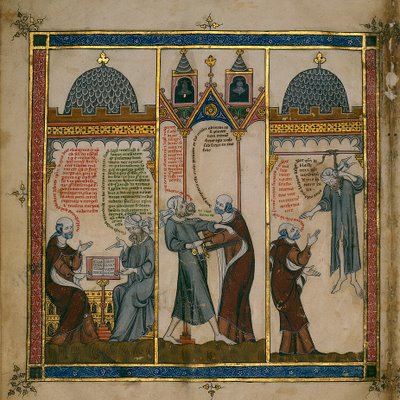
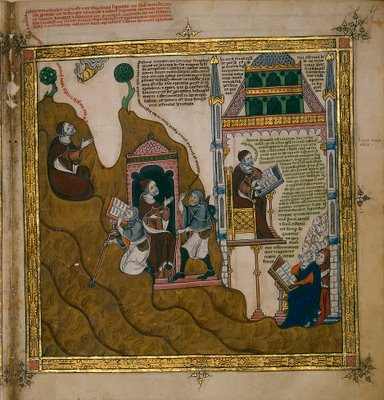

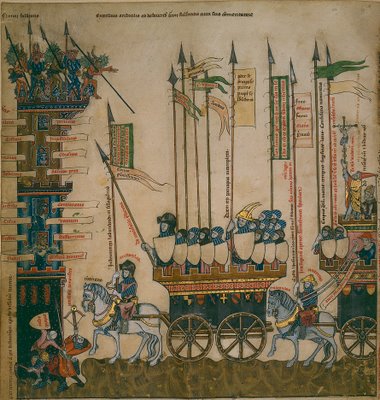
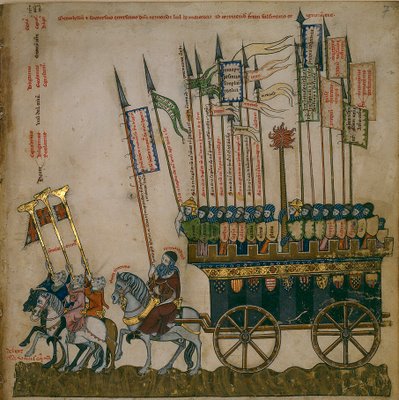



Another of the german digital media sites I blindly 'peruse' from time to time is Dr Klaus Graf's Archivalia. I followed a link today and gratefully came upon the beautiful 14th century images above, which I began downloading. {click on each image for an enlarged view}
Going back and doing some translating and quite a bit more digging, I found out that this beautiful illuminated manuscript is one of 3,500 (out of a total of 4,200) which, through some interesting legal wrangling, are being returned by Badische Landesbibliothek in Karlsruhe (State library of Baden-Württemberg) to the Baden family, who intend to sell them to pay for the upkeep of Salem castle. They apparently need 70 million Euros to restore and maintain their last remaining property. By all accounts and measures this is a priceless and culturally significant collection and it is surprising that there has been almost no media coverage outside of Germany.
However, the academic manuscript and archive community around the world have been rallying in the last week or so to petition the Baden-Württemberg regional government to prevent the sale and dispersal of the collection.
"The majority of manuscripts in question come from the libraries ofLinks to english language reports/developments/petitions: Archivalia; Cronaca.
monasteries in the Black Forest, the Upper-Rhine, and Lake Constance.
They document a unique path of spiritual life in this region, and how
it developed. With few exceptions, these manuscripts arrived in the
care of the state 200 years ago during the secularization, which
expropriated the monastic libraries. Since that time, they have been
conserved and made available to the public under considerable
application of technology and public means. This sale will scatter
them to all ends of the globe."
[from a translation of an Open Letter published in 'Neue Züricher Zeitung' accompanying an article entitled "Philistines in Baden: End-of-Season Manuscript Sale in Karlsruhe"]
With respect to the manuscript images above ('Badische Landesbibliothek St Peter perg. 92': Raimundus Lullus – Thomas le Myésier. Electorium parvum seu breviculum.) -
"The significance of this MS, compiled c.1322 by Thomas le Myésier, lies not only in its illuminations, but also in the extensive texts preserved within these illuminations. A fantastic series of 12 full-page miniatures describes the life of the great Spanish philosopher Lull (died c.1315/16) and presents in allegorical form the content of his work. These miniatures, extraordinary for their artistic merit and originality have texts arranged in various shapes, some of them in gloses that could suggest a precursor of the modern “comic strip”."
The images are all from this page showcasing the manuscripts (tenuously, possibly formerly) held by Badische Landesbibliothek.
Is this an early form of graphic novel? Beautiful manuscript.
ReplyDeleteWell this says 1978 but perhaps there should be a link to this page?
ReplyDeleteWell, as long as I get to be one of those "ends of the Earth". Though I dream of owning such nice books, I know I could never care for them the way they deserve.
ReplyDeleteAnd putting them in museums is not the answer either. They get lost in museums.
That's anachronism for you. Calling Ramon Llull a spaniard! He's of course a Catalonian. No way you can call him a spaniard when spain wasn't even there. Catalonia only fell to the castilian (later "spanish") crown in 1714.
ReplyDeleteI was all prepared to defend that characterisation on the basis of contemporisation and making things kind of seamless in ease of understanding for a general readership, but then I noticed they weren't my own words and I was quoting from another source.
ReplyDeleteSo I acknowledge and agree with you ... to an extent. There is of course a minefield lying between the original context, my own ignorance and the desire to make the material accessible.
It is perhaps a moot point in this particular example, and I'm sure the majority of the readership would be happy either way if it had been me choosing between describing Llull as Catalonian or Spanish, but I tell you truthfully: the geographical and nationality descriptions that appear in this blog are always going to be sensitive subjects for some people, whether I try for historical accuracy or go for the broad brush approach within a modern context.
I'm not so much feeling guilty from the point you raise - it's of course completely valid - but it is one of the considerations that I give some thought to as I try to carefully make my way along this weird illustrative journey, this BibliOdyssey.